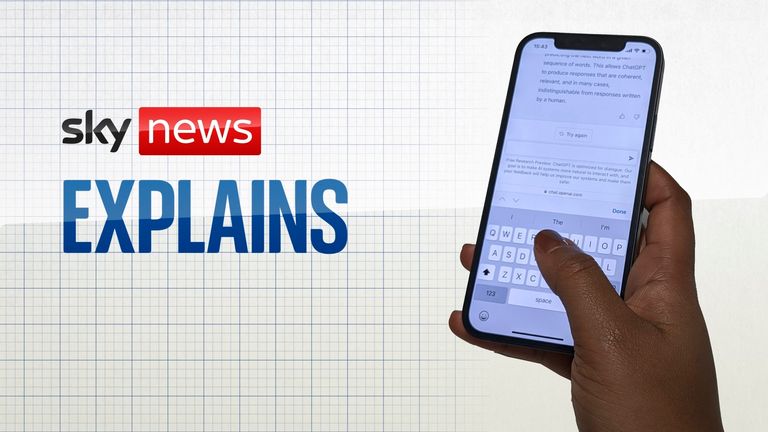People on mental health waiting lists cautioned not to turn to chatbots | Science & Tech News
People waiting months for mental health treatment have been cautioned against turning to chatbots as a quick alternative.
One in four patients are now waiting more than 90 days between their first and second appointments for NHS talking therapy treatment, according to analysis by charity Future Care Capital (FCC).
The free sessions, delivered by fully trained and accredited practitioners, are meant to support those who suffer from conditions like anxiety and depression.
But thousands of people are facing long delays, with demand for treatment having risen since the pandemic.
A recent survey by the FCC found 87% of people struggling with their mental health were now using apps to get help, with 31% leaning on such tools because they did not want to wait for face-to-face support.
Dr Lauren Evans, director of research and innovation at FCC, said such resources had a role to play but cautioned against the use of increasingly popular chatbots, which have been tipped as an alternative to search engines.
“Although chatbots have been used for a while to direct telephone enquiries or provide basic information, it is an entirely different endeavour to gauge not only what somebody is saying, but the way they are saying it and what that might entail,” she told Sky News.
Digital tools ‘must be tested to high standards’
Since the pandemic, Google has reported an increase in the number of searches related to mental health, notably depression and anxiety.
People are also turning to social media to find support. Research by Luna, an app designed to help teenagers with mental health struggles, suggests more than eight in 10 young people are using TikTok to diagnose their troubles.
According to the FCC’s survey, people are now more than twice as likely to find a digital mental health tool on social media than through their GP.
Chatbots specifically released to be digital therapists have also grown in popularity in recent years – examples include Woebot and Wysa, which are both highly rated on Apple and Google’s app stores.
But new language models like the successful ChatGPT from OpenAI are not designed for this purpose. Despite this, asking questions about mental health will still see it confidently deliver an answer – even if it’s wrong.
Dr Evans warned: “Any such technology needs to be subjected to rigorous testing with high standards – and it could prove to be revolutionary.
“But it should not be implemented in place of face-to-face treatment with a medical professional.”
Read more:
Google launches new AI chatbot
Microsoft upgrades Bing with ChatGPT features
‘People want the human touch’
UK charity Samaritans, which operates a free 24/7 helpline for people who are struggling, has also stressed the importance of human interaction when seeking mental health support.
Kay, a volunteer who signed up after receiving help during her own struggle with anxiety, told Sky News: “I don’t think chatbots would be entirely helpful, because you just don’t know what call you’re going to take.
“When people talk, they want the human touch, to feel they’re talking to a real person who can empathise.”
Read more:
10,000 calls a day – but they all start the same
Guide to digital mental health resources
In a bid to ensure those who do seek help online find an appropriate resource, the FCC has launched a new comprehensive guide that directs people towards trusted apps and platforms.
The digital mental health tools guide allows users to filter resource based on conditions like addiction, anxiety, stress, body dysmorphia, eating disorders, and self-esteem.
“Digital tools are not a substitute for in-person mental health treatment,” Dr Evans stressed, “but can be used in conjunction with professional support and may help people waiting between treatment sessions.”
Anyone feeling emotionally distressed or suicidal can call Samaritans for help on 116 123 or email jo@samaritans.org in the UK. In the US, call the Samaritans branch in your area or 1 (800) 273-TALK

